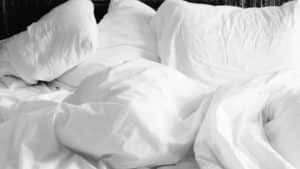Quality sleep makes you feel better, but its importance goes way beyond just boosting your mood or banishing under-eye circles. Adequate sleep is a key part of a healthy lifestyle and can benefit your heart, weight, mind, and more.
Some health benefits researchers have discovered about a good night’s sleep are improved memory, longevity, reducing inflammation, spur creativity, enhance cognitive performance, improve attention, weight control, and steering clear of depression and anxiety.
Insomnia is the most common sleep disorder in the U.S., affecting nearly one out of every three adults at some point in life. More women suffer from insomnia than men, and as people get older, insomnia becomes more prevalent. According to the National Sleep Foundation, the average American only gets about 6.9 hours. When you add depression to the mix, the problems with sleep are compounded.
Normal sleep is a restorative state. However, when sleep is disrupted or inadequate, it can lead to increased tension, vigilance, and irritability. Physical or emotional trauma and metabolic or other medical problems can trigger sleep disturbances. Poor sleep can lead to fatigue. With fatigue, you exercise less and that leads to a decline in your fitness level. Eventually, you find yourself in a vicious cycle of inactivity and disturbed sleep, which causes both physical and mood-related symptoms.
Tips On How To Get The Best Sleep
If you are having sleep problems, whether you are not able to fall asleep, wake up too often, don’t feel well-rested when you wake up in the morning, or simply want to improve the quality and quantity of your sleep, try as many of the following techniques below as possible.
Don’t look at the clock– Turn the clock around to face the wall, or hide it in a drawer or under the bed. Constantly checking the time will only arouse you and reinforce the idea that you’ll not fall asleep. Also, avoid using loud alarm clocks. It is very stressful on the body to be awoken suddenly.
Don’t sit in bright light – Sleep in complete darkness or as close as possible. When light hits the eyes, it disrupts the circadian rhythm of the pineal gland and disturbs the production of melatonin and serotonin. There also should be as little light in the bathroom as possible if you get up in the middle of the night.
Don’t do anything too stimulating – No TV right before bed. It is too stimulating to the brain and it will take longer to fall asleep. It is also disruptive of pineal gland function. Read something positive, spiritual, or calming. This will help you to relax. Don’t read anything stimulating, such as a mystery or suspense novel, as this may have the opposite effect. In addition, if you are really enjoying a suspenseful book, you might wind up unintentionally reading for hours, instead of going to sleep.
Check your hormones – Have your hormones checked by a good clinician. Scientists have found that insomnia may be caused by adrenal stress (Journal of Clinical Endocrinology & Metabolism, August 2001; 86:3787-3794). Other hormonal imbalances, like menopausal or perimenopausal-related symptoms, can affect sleep as well, so it is wise to do a comprehensive test in this regard.
Consider your diet and bedtime snacks – Get a proper before-bed snack, avoid sugary treats. This will raise blood sugar and inhibit sleep. Later, when blood sugar drops too low (hypoglycemia), you might wake up and not be able to fall back asleep.
Keep your feet warm – Wear socks to bed. Due to the fact that they have the poorest circulation, the feet often feel cold before the rest of the body. This might reduce night waking.
Keep a journal – If you often lay in bed with your mind racing, it might be helpful to keep a journal and write down your thoughts before bed.
Early bedtime and stick to it – Get to bed as early as possible. Our systems, particularly the adrenals, do a majority of their recharging or recovering during the hours of 11 PM and 1 AM. You should go to bed, and wake up, at the same times each day, even on the weekends. This will help your body to get into a sleep rhythm and make it easier to fall asleep and get up in the morning.
Temperature– Keep the temperature in the bedroom no higher than 70 degrees F. Many people keep their homes and particularly the upstairs bedrooms too hot.
Avoid caffeine – In some people, caffeine is not metabolized efficiently, and therefore they can feel the effects long after consuming it. So an afternoon cup of coffee (or even tea) will keep some people from falling asleep. Also, some medications, particularly diet pills contain caffeine.
Avoid alcohol– Although alcohol will make people drowsy, the effect is short-lived and people will often wake up several hours later, unable to fall back asleep. Alcohol will also keep you from falling into the deeper stages of sleep, where the body does most of its healing.


